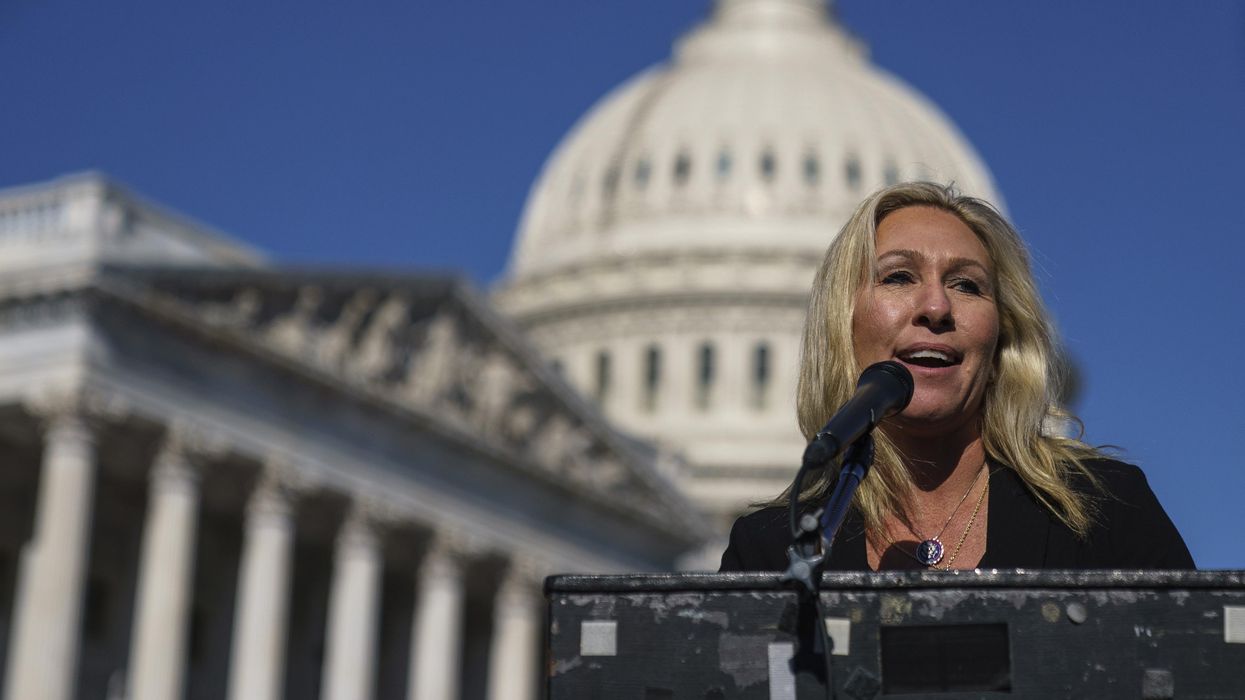Kendall-Taylor is the CEO of the FrameWorks Institute, a nonprofit research organization that helps build public sentiment for progressive policies.
With Donald Trump out of the Oval Office and the coup attempt a month behind us, the Republican Party has now turned to the business of saving its soul.
When Senate Minority Leader Mitch McConnell calls out a congressional colleague as a "cancer on the Republican Party," you know the leadership is concerned. But such statements about the QAnon-supporting Rep. Marjorie Taylor Greene of Georgia or any others in the growing ranks of dangerous elected officials from the fringes, without tangible punitive action, will do nothing to ensure the party is able to permanently renounce borderline authoritarianism and reclaim its more sensible and mainstream values. So what could?
The answer is that a good chunk of these fringe representatives must get voted out of Congress and state legislatures before the GOP can resume any semblance of functionality. Only then will the country get an actual shot at moving toward the sort of unity of purpose that a functional democracy requires.
That's an open invitation for younger Americans. More people from Generations X, Y, and Z need to run for office — Republicans, yes, but also Democrats and independents — in order to safeguard the two-party system and our governing system more generally.
Why younger people? More than any other age group, voters younger than 45 recognize that social systems — including educational structures, the economy and our justice system — need a fundamental reworking if they're to produce better outcomes, more equitable results and a sense of cohesion.
What younger Americans recognize, no matter their political affiliation, is that there's a connection between system failure and the many problems we live with today — from unmitigated forest fires, to the millions living with dead-end jobs, to the growing roster of unarmed Black men shot by police. Indeed, such recognition is what will ignite the fundamental systems change required to right the wrongs of American history and lead us all (conservative and liberal alike) to a better tomorrow.
This ignition is what's needed to push our legislators to implement solutions on such pressing matters as climate change, income inequality and systemic racism, plus a host of other issues. Legislative bodies are where we get this done. And those elected to them must use their posts to address systemic damage now. They must not use their offices as bully pulpits to call mass shootings "hoaxes" or incite crowds to ransack the Capitol, or declare war against and encourage the murder of opponents.
Can you believe we even have to say that?
My think tank uses social science to identify how people view, and ultimately change their minds about, today's most pressing issues. The work has convinced me that good ideas, ranging from better public education to smarter national security to more effective health care, should catch hold no matter who enjoys the majority. And this can be accomplished while leaving ample room for our inevitable political disagreements and pendulum swinging.
But what's deeply troubling, and dangerous, is when one party in a two-party system permits itself to get hijacked by a strongman, insurrectionists and an ever-growing league of fact-denying conspiracy theorists.
Research shows that polarization increases much faster in democracies led by an executive who creates (or, in Trump's case, recreated) a political party. It's less likely to happen when better-defined parties, with clearer sets of shared values, choose their heads. But allow a strongman to hijack the system, and the party doesn't just go under — the whole democratic experiment might well blow up.
So the point now isn't to save the GOP for its own sake, but to ensure continuity of two functioning parties for the sake of a flourishing system of government.
This isn't a push for conservative reform dressed in liberal's clothing. No one who's carefully considering how to save democracy thinks it's realistic for the GOP to adopt every last characteristic of the Democratic Party (which suffers from its own problems) in order to effectively reform.
Assuming we move toward a stronger democratic system, with a lower case "d," both parties will still quibble over policies, sometimes swapping them back and forth while calling each other out. Politics will never be dull. But younger conservatives have a distinct opportunity to push for things they care about, like balanced budgeting and tax reform, while still applying their systems-based thinking to our bigger issues — climate change and racism — that research tells us most of them care about.
Here's the thing: The GOP won't clean its own slate any time soon, or replace its current representatives with fresh new ones in the next election cycle. Systemic change, even the urgent kind, takes time. But younger Americans can become more involved in politics right now, without having to plan a run for office.
Whether by making the pledge to consistently vote, making those in power actually accountable to them, or actively engaging in policy creation at all levels of government, younger Americans can influence the country — and remedy systemic plagues — with their community-based mindsets. And we all better hope they do.



















